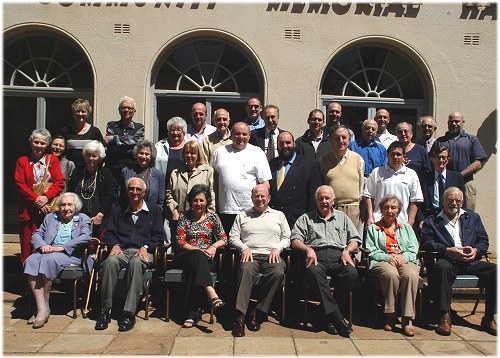|
Does
Zimbabwe Jewry have a future ? - 2004

Delegates to the Central African Zionist Federation biennial
congress.
Does Zimbabwe Jewry have a future? This, in keeping
with the ongoing downward trend in the Jewish community and the
country as a whole, was the theme of the combined Zimbabwe Jewish
Board of Deputies and Central African Zionist Federation biennial
congress, which took place on 4-5 September in Harare. This was the
second consecutive occasion in which the two organizations had held
a joint conference, with delegates from nearly all the 450-strong
community’s Jewish organizations attending.
South African participants at the conference were SAJBD National
Chairman Michael Bagraim, who delivered the keynote address at the
opening, Rabbi Moshe Silberhaft, Spiritual Leader to the African
Jewish Congress, Irene Zuckerman, chairperson of the African Region,
International Council of Jewish Women and Mark Notelovitz, National
Chairman of the Community Security Organisation. Both Bagraim and
Rabbi Silberhaft emphasized the need for serious rationalization and
consolidation to take place within the Jewish communal structure if
the community was to survive the current crisis.
In his report Peter Sternberg, President of the Zimbabwe Jewish
Board of Deputies and a Vice-CHAIRMAN of the African Jewish Congress
(AJC), gave an overview of the work of the ZJBD, including its
recently concluded restoration project for all the country Jewish
cemeteries. Because of escalating costs and because the day-to-day
workload no longer warranted meeting those increases in expenditure,
he said, it had been necessary to close the ZJBD’s offices in both
Harare and Bulawayo earlier that year. To ensure the continued
functioning of the ZJBD, certain duties were being split and this
would continue for the foreseeable future. Fortunately,
inter-religious relationships were positive, and Zimbabwe Jewry
remained relatively untouched by anti-Semitism.
Interviewed by the S A Jewish Report after the conference, Sternberg
said that it was imperative that Jewish organizations begin running
along proper business lines business instead of carrying on as
before and hoping for the best. While pointing out certain instances
in which the community was starting to adapt to the challenges and
stressing the importance of the assistance given by the AJC, and
Rabbi Silberhaft in particular, to Zimbabwe Jewry, he was careful
not to downplay the difficulties the community was facing. The
reality, he said, was that most young people had already left, the
elderly members remaining were either also leaving or passing away
and Jewish immigration had dried up completely.
“It is very difficult to be optimistic in this climate. We can only
hope that we can manage to keep things going for the foreseeable
future” he said.
Rabbi Silberhaft, who also officiated at the Shabbat services, urged
people not to bring their despondency with them into shul but rather
to use going to shul as an opportunity to find renewed strength to
face up to their problems. Difficult as the situation had become, it
should be understood, and accepted, as part of G_d's masterplan, he
said. Isaac Menashe, co-president of the Central Zionist
Organisation appealed for more volunteers to come forward to ensure
that Zionist activities in the country continued whilst paying
tribute to the few dedicated people, particular from WIZO, who
continued to shoulder the burden. Referring to the ongoing terrorist
campaign in Israel, he stressed the need for every Jewish community
in the Diaspora to show solidarity.
“Israel’s most permanent and vociferous supporters should be the
Jewish Diaspora and that includes Zimbabwe, no matter how small we
may be” he said.
A message of solidarity and good wishes was read out on behalf of
African Jewish Congress President Mervyn Smith, who was unable to
attend the conference. Smith wrote that the “unflagging devotion” of
the proud Zimbabwe Jewish community to maintain its links with
Judaism and Israel was “a remarkable example to all of us”.
Also giving reports were representatives of the Sephardi and
(Ashkenazi) Harare Hebrew Congregations, Union of Jewish Women, WIZO
and the Sharon School and Harare Hebrew Nursery School. In Bulawayo,
drastically reduced numbers have already led to the amalgamation of
all ladies organizations into a single Jewish Women’s Communal
League. The Sephardi and Harare congregations again held separate
Rosh Hashana services this year but will come together for Yom
Kippur. Unlike Bulawayo, which despite having a smaller Jewish
community still has the services of a rabbi, neither Harare
congregations currently has a spiritual leader.
While only 19 of Sharon’s 200 pupils are of full Jewish parenthood,
with another eleven having a Jewish father, the school enjoys a high
reputation. 200 interviews being conducted for thirty 2005 Grade 1
places. Bertie Bondie, chairman of the Governing Body of Sharon,
described the serious clash that had occurred between the Ministry
of Education and all private schools, with the latter demanding that
fees levied could not exceed the amount prescribed by the
government. This had necessitated seeking donations to ensure that
monies required by the school over and above that laid down by the
Ministry would be forthcoming. Bondi attributed the Ministry’s
stance to muscle flexing with a view to catching votes. |
